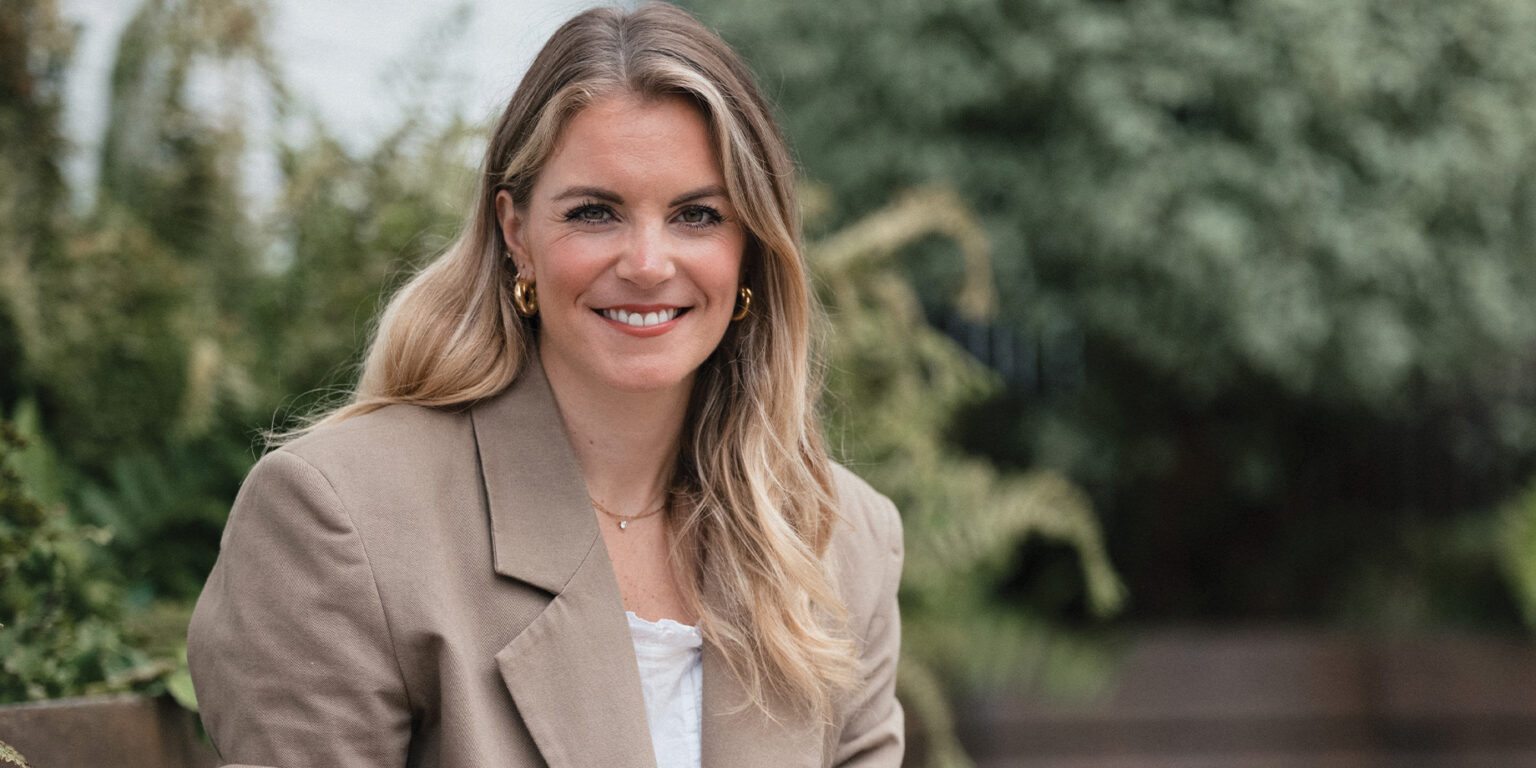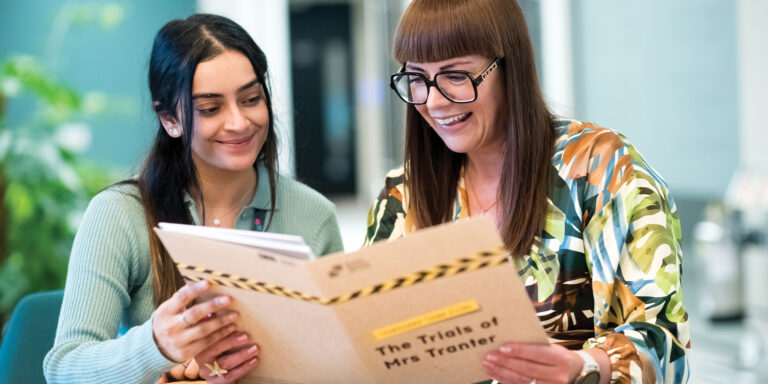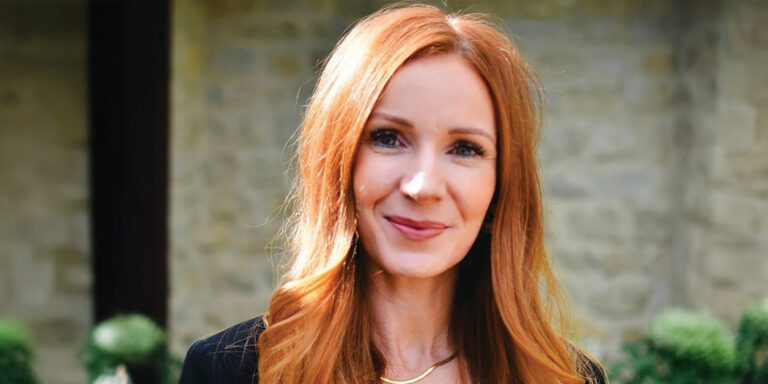Only a few minutes’ walk from Liverpool Street station, in the City of London, you can turn off a busy road where Amazon has its giant UK HQ and enter a small oasis of calm. This quiet location feels like something of a metaphor for the achievements of Too Good To Go and its managing director, UK and Ireland, Sophie Trueman.
That’s because, since it was founded in Denmark in 2015, the company has quietly – but steadily and assuredly – disrupted the food retail and hospitality sectors, partnering with major players and local independents alike to connect customers to restaurants and stores that have surplus unsold food. Amid the noise of tech innovation, Too Good To Go’s simple mobile app has quietly had a major impact on reducing food waste.
“Too Good To Go has a very clear mission,” says Trueman. “To inspire and empower everyone to fight food waste.”
There is also a clear necessity behind that mission. More than 40 per cent of all food that is produced is wasted – every single day. It’s a figure that Trueman describes as “horrifying”. Indeed, food waste is a bigger emitter of greenhouse gases than the aviation industry, which makes it a significant contributor to climate change.
“People don’t realise that food waste is such a big contributor to climate change”
“Our business exists to try to help solve that problem and to do our bit for climate change. There’s quite an awareness gap with the public,” she says. “People don’t realise that food waste is such a big contributor to climate change. Helping tackle food waste is one of the most important things, on an individual level, that we can do to help try to solve climate change. That’s the principle of our business and the issue we’re trying to solve.
“The Too Good To Go solution is very simple. Our app, which is free and available for anyone to download, connects users, like you and I, with stores all over the globe that have surplus food available. It could be your independent local bakery or a large multinational food retailer. The app helps any business save food from going to waste.
“I like to think about it as a triple win. It’s a win for all of our partners because they can use the technology to save their food from going to waste. It’s a win for consumers, who are able to get good deals to access great surplus food, and it’s a win for the environment, the planet and sustainability.”
Well, it’s certainly working, and Too Good To Go has global ambitions.
“The beauty of the tech solution is that it works for really small, independently run businesses that might just have a couple of pastries left at the end of the day, all the way through to some of our partners in the UK, such as supermarkets Aldi and Morrisons, that might have larger amounts of waste. The stats speak for themselves. Globally, we’ve saved more than 350 million bags of food from going to waste. We are present in 18 markets at the moment and are about to launch into Australia. I think that proves the concept works.”
New challenges
Trueman joined Too Good To Go in 2019, to head up the key accounts team. Her earlier career had mainly been in the fast-moving consumer goods (FMCG) sector, including six years in various commercial roles at L’Oréal.
“L’Oréal is a fantastic place to work and it was an incredible platform to really start my career,” she says. “It was on a sabbatical with the company that I had a real light-bulb moment, during six weeks’ volunteering in the Philippines with a marine conservation charity, looking at ocean plastics and the impact 0f the beauty industry, and doing beach and deep-sea clean-ups.
“I was coming out of a dive with a sack of ocean plastic on my back and I knew I wanted to find a company that had an exciting mission that I could get behind. I realised I wanted it to be in sustainability and to try my hand in the tech space. Very importantly for me, I wanted to go somewhere that had a business model that worked. With Too Good To Go, it felt like all of those stars aligned.
“I wanted to push myself out of my comfort zone and help scale a business”
“I also wanted to push myself out of my comfort zone and try something where I could help scale a business. One of our values here is to keep it simple, but that can be hard to do in practice when you’re trying to embed into some of the large businesses with which we work. For example, Greggs bakery chain is a key partner in the UK; it has close to 3,000 stores, so challenges arise to that simplicity. You can learn from that challenge.
“When I joined, I needed to adapt from being at a large corporate, professional global company to one that, at the time, was still a start-up that was moving into the scale-up phase. One of the key learnings I took was that you can take some of the principles and processes from a large corporate business and embed and tailor them to a different type of business. If you do that in the right way, things can really fly.”
Trueman says her role was to understand how Too Good To Go could attract and win big partnerships, and how it could segment the team to win them.
“I joined to head up the key accounts team, but I had no-one in my team at that point, and I had a handful of historic accounts. To lead the change we needed, it was clear there was going to be a real importance on that initial team that was hired. Success really came about a year in, when we’d hired the correct profiles to help scale this amazing concept.”
Complexities of scale
As Trueman recounts the scaling-up process and Too Good To Go’s consequent growth, a theme emerges in which the mission and mantra of simplicity meets – and is challenged by – real-world complexities. Today, the business’s stakeholders and partners range from individual consumers and independent restaurants, to major retailers, local authorities and national government. How do they all connect, and how is the right balance maintained? For Trueman, the key is their interdependence.
“Ultimately, our priority is the 170,000 stores with which we are working, ensuring they are our priority and that we’re helping them save as much surplus food each day. But then there are other aspects to do with the wider impact of what we do and how we influence all those stakeholders and bring them together. We have held events where we have brought together consumers and local authorities, and got them round a table to foster discussion. It’s something I’m proud of the company for doing, but it takes time, and the key is how they all work in tandem.”
Managing complexities and balancing priorities to leverage influence, impact and growth demands confident, thoughtful and intuitive leadership, Trueman says.
“I’ve thought a lot about how I can be authentic, understanding myself and being true to that. One of the things I think about is that I don’t run Too Good To Go, the team runs Too Good To Go. I help lead and navigate the conversations about what direction we should set. So how do I want to engage in those conversations and remain consistent yet agile? It’s also about not being afraid to be vulnerable if we get it wrong and we need to pivot or change the way that the business is working. I think you have to be really clear on what type of leader you want to be.”
But what kind of leader does Trueman want to be?
“I want to do what I say I’m going to do, and I want to be trusted and respected,” she says. “It’s basic fundamentals, but I hope to be a great role model for the team and someone that they see fostering a really great place to work. I think I’m a very open leader; I’m very honest and direct – I’d hope that the team would say that about me – but I think I’m true to my personality as well. Some of the best leaders are ones who really know themselves and can lean on their strengths, but who are also hyper-aware of areas they could develop and are not afraid to be vulnerable.
“Continuous learning is absolutely critical in leadership. Often, the more you get into leadership roles you are ‘on the balcony’, versus being in the field and the thick of the action. It’s important to keep learning from the team and not getting too far away from the problem, which is why I still try to go to stores to sign them up to Too Good To Go. If you are only ever on the balcony, you’re going to miss what’s going on.”
Supporting change
Over the past five years, the connectedness and shared understanding of teams, businesses and wider stakeholders has underpinned Too Good To Go’s growth – and the changes that have been required to support it.
“Change is not a solo sport,” Trueman says. “It involves multiple people and team efforts to get around it. A diverse network solidifies your resilience and the stronger, more diverse your networks are, personally and professionally, the more you can lean on different perspectives to help keep your resilience strong. I like to make sure my network is continually growing and that I’m learning from different people. It’s also a bit like that old airline advice – you need to put your own oxygen mask on first, before helping others. You need to make sure you prioritise maintaining energy; how can I top up my own energy, and have periods when I take a bit of a step back and renew?
“Change is inevitable. If we don’t adapt we become stale”
“Ultimately, with change, it’s about communicating that change is inevitable. If we don’t adapt – whether that’s to do with the focus of the company or the particular way we speak with our partners – we become stale. When we are talking to our stores and partners, we need to find the balance of consistent messaging, but remember that what’s important to one partner might be very different for another.”
As she speaks, Trueman’s personal connection to Too Good To Go, and her work there, feels natural and authentic. She describes the app as a “simple and fun solution that is easy to do and will spark some joy and bring some magic to your day – and I think that is what everyone needs when things are difficult”. It’s a smart, positive and simple aid to the thorny issue of food waste – but which aspects of that positive mindset might work for leaders in different sectors?
“I think it’s positive to make sure you are a role model in your industry, to do what you say you are going to do, and have credible ways to back up your claims,” she says. “That means cutting through the noise with a simple, clear message and delivering on it.
“Second, it’s about working together. Collaboration is key. How can you break down those competition lenses and collaborate as an industry, as a community, and as a society? Finally, when you are trying to achieve something worthwhile, you need to raise awareness and foster a conversation about it within your teams – because change takes time. To make good things happen, those voices need to keep being heard.”
Too Good To Go: a brief history
Too Good To Go was founded in 2015 in Copenhagen, by a group of young entrepreneurs who wanted to find a solution for the food wasted by buffet restaurants in Denmark.
The solution they created was an app that connected food businesses with people who were seeking to help solve the climate crisis, get access to good food, and save money.
The Too Good To Go marketplace app launched in Denmark early in 2016. In the first few weeks, hundreds of businesses uploaded their surplus food to the app and thousands of users started saving it.
Later that year, a group of additional food enthusiasts joined forces with the original founders. Having tried to find solutions to solve the food-waste issue in their home countries across Europe, they established Too Good To Go in Norway, the UK and France.
In September 2016, Mette Lykke, a Danish entrepreneur and co-founder of fitness community Endomondo, learned about the app from a woman while travelling on a bus. Intrigued by the innovative idea, Lykke reached out to the founders and became an investor in the company.
In the spring of 2017, inspired by Too Good To Go’s mission, Lykke took over the role of CEO.
By the autumn of 2024, Too Good To Go operated in 18 countries across Europe, America and Australia, with a community of more than 100 million registered users and 170,000 active partner businesses across the globe.
Martin Bewick is a writer and editor at CPL One
This article is adapted from a feature first published in the autumn 2024 issue of Edge.





